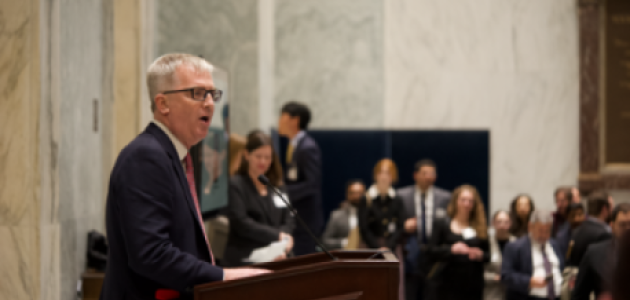A weekly digest of the latest news and research related to the work of the Technology, Economics, and Governance Working Group. Topics covered in the digest include cybersecurity, domestic regulation, innovation, international competition, social media disinformation, and the California exodus.
Industrial Policy, International Competition and Cooperation
Apple and Google, Under Pressure From Russia, Remove Voting App | The New York Times
In the run up to Russia’s recent elections, the Kremlin pushed tech giants Apple and Google to ban opposition leader Aleksei Navalny’s app, which aimed to consolidate protest votes under one candidate per district. The move is not an uncommon one in Russia, but the methods by which the government aimed to take down the app, threatening to arrest employees of both companies in the country if they did not comply with the order, are new. Allies of Navalny called the decision a “shameful act of political censorship” and the lengths to which the ruling United Russia party went to take down the app likely demonstrate the potential damage it could have done.
Google Is Getting Caught in the Global Antitrust Net | Wired Magazine
A Turkish court has preliminarily ordered Google to stop padding local search results with its own subsidiaries, citing a law that prohibits firms from abusing a dominant market position to exclude competitors. Google’s international expansion has exposed it to hundreds of new regulatory systems, and in recent years, large tech companies have often decided to adopt a universal shift in policy instead of facing the cost of maintaining different legal behaviors in different countries. It remains to be seen whether the Turkey case will ultimately press Google to make serious global changes to its search function.
Domestic Regulation
Twitter seeks to settle 2016 class action lawsuit for $800 mln | Reuters
On Monday, Twitter announced that it would pay $809.5 million to settle a class action lawsuit that was launched in 2016 by its shareholders. The plaintiffs alleged that the tech giant released misleading information to conceal stagnating user engagement and artificially inflate its stock price. Twitter's decision to settle comes just before jury selection was set to begin.
Tech giants quietly buy up dozens of companies a year. The Biden administration is finally noticing. | The Washington Post
Big Tech has caught the eye of many concerned antitrust advocates after the pandemic marked a massive increase in large mergers. Proponents of increased regulation argue that these firms have managed to exploit weaknesses in existing antitrust policy by leveraging their unprecedented size. Even billion-dollar acquisitions can go unreported if they comprise a small percentage of a corporation’s total market capitalization. Similarly, antitrust agencies can do little to regulate serial purchases of smaller firms, which has become a common strategy among tech giants.
Innovation
AI Tools for Military Readiness | RAND Corporation
The RAND Corporation released a report this week that explores the potential of AI to critically evaluate the U.S. military’s monthly readiness assessments. The research team used natural language processing methods to develop a model that correctly predicted which of the four readiness levels a unit would report 75 percent of the time. The architects of the project anticipate that such models could be used to ‘gently prod’ military leaders toward greater qualitative precision when formulating their readiness assessments.
Cyber
$5.9 million ransomware attack on farming co-op may cause food shortage | Ars Technica
On Monday, hackers attacked NEW Cooperative Inc., an Iowa farming cooperative, demanding nearly $6 million for a decryptor. While the Ransomware group responsible for the crime claims that it does not target ‘critical infrastructure,’ NEW Cooperative warned the hackers that their attack could ‘break the supply chain’ and result in a ‘very public disruption to the grain, pork and chicken supply.’
Lithuania says built-in cybersecurity risks found in Chinese-made Xiaomi and Huawei phones | CBS
After a Lithuanian investigation uncovered several serious cybersecurity risks present in phones manufactured by Xiaomi and Huawei, the country’s cybersecurity specialists recommended that the government cease their use of Chinese-made smartphones. While most of the risks were associated with pre-installed apps and personal data leakage, Lithuania’s National Cyber Center also warned that Xiaomi phones contain a dormant framework for dynamic content-filtering that could be activated in the future.
Air Force cyber defense taking aim at core weapon systems | Defense News
As cyber actors have become increasingly bold in the past decade, the Air Force has begun to shift its information warfare strategy towards defending critical capabilities from attacks by hostile actors. Lt. Gen. Timothy Haugh, the commander of 16thAir Force (the Air Force’s main information warfare entity) noted that many of the current weapons systems pe-date the modern cyber threats perpetuated today by Russia and China. In an effort to reduce risk to those systems, the Air Force has established various mission defense teams to guard key installations and infrastructure from attack. The response is predicated on a more flexible cyber force and an ability to integrate conventional and cyber operations.
California
What just happened with single-family zoning in California? | The LA Times
California recently passed two housing bills aimed at making it easier to build housing in the state. The first bill, SB9, shifts zoning restrictions and allows more multi-unit housing. The second, SB10, allows denser development near public transit lines, such as trains and buses. The bills together will allow developers to shift their strategies at a time when over 60% of all residences in California are single-family homes and housing prices are prohibitive for many.
Freedom of Speech, Domestic Democracy, and Extremism
Huge hack of alternative web services provider Epik could be ‘a Rosetta Stone to the Far Right.’ | The Week
Epik, the web services provider for many far-right organizations that are banned by larger platforms, suffered an enormous data breach earlier this week, with over 150 gigabytes of personal information leaked by the hacking collective Anonymous. The leak includes such information as home addresses, names, and purchase records which can be used to easily identify those behind major websites. Epik clients have included sites like 8chan, Gab, and Parler. Extremism researchers and activists have used the leak as an important window into the far-right, although the disclosures are so vast that it will likely take years to fully sift through all the information.













